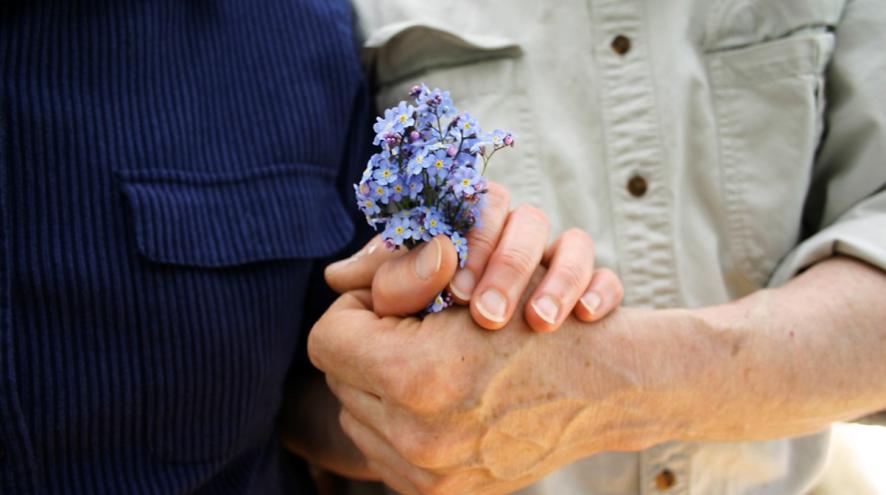New report: Everyone should have someone
In January 2022, the Alzheimer Society of B.C. launched a survey exploring family experiences during the height of visitation restrictions in long-term care. Read the report, “Everyone should have someone: Learning from caregivers’ experiences of long-term care visitation during COVID-19.”

This past Sunday was Father Day’s, a time for families to come together. During the last two years, this was not always possible – especially for people with family members living with dementia in long-term care who were subject to the visitation guidelines brought by the pandemic.
Hoping to reflect on the impact of these guidelines and ensure lessons learned shape future policy and process, the Alzheimer Society of B.C. is releasing a special report called, “Everyone should have someone: Learning from caregivers’ experiences of long-term care visitation during COVID-19.” Based on a survey launched by the organization in January 2022, the report identifies challenges families faced navigating the guidelines.
Introduced in the early days of the pandemic, visitation guidelines were intended to balance safety protocols with the need for families to maintain their connection with residents. Through the creation of an “essential visitor” designation, one family member was allowed to have ongoing access to the care home, even in the event of an outbreak. Over time, the guidelines were revised to allow for every resident to have a visitor, with additional designations like “social visitor” introduced.\
Survey responses – received from caregivers, family members and friends of people living in long-term care throughout the province – illustrate the disconnect between the written guidelines and how they were applied. With the health-care system already stretched thin by the pandemic, people faced changing policies, inconsistent communication, confusing applications and appeal processes. Included in the key insights:
- Only 52 per cent of respondents received explicit instructions from care homes about how they could apply for essential visitor status.
- The people who did receive instructions from care homes applied at twice the rate of people who didn’t receive instructions and were also twice as likely to be successful in comparison to people who were navigating the process without guidance.
- Forty per cent of the people who didn’t receive instructions from their care home were not even aware that applying to be essential visitors was an option.
The guidelines specified family members could apply for essential visitor status for several reasons. Of the people who responded to the survey, 29 per cent listed physical care – including support with eating or bathing – as the sole or partial reason for applying, while 59 per cent indicated they applied because they wanted to provide assistance with mental health and well-being. The most common reason for people being denied access was that the care provided by staff was considered sufficient, or the applicant was not considered essential.
“Families and friends provide essential support and love,” says Jen Lyle, Alzheimer Society of B.C. Chief Executive Officer. “A caregiver denied access can’t provide crucial daily care or the reassurance, comfort and familiarity that helps a person living with dementia maintain their sense of self and well-being.”
For many, daily care can mean brushing someone’s hair, talking about daily events or ensuring they can maintain lifelong routines. Caregivers also provide residents with vital human touch and a connection to others in their lives. Their very presence helps residents remember who they are and the life they’ve lived.
With the survey unearthing clear common themes from people’s experiences, the report includes key recommendations on how people’s lived experience can and must inform the policy and processes related to visitation and outbreak protocols going forward.
“These survey results give greater clarity to one of the most heart-breaking examples of how well-intended policies can do harm, and to the devasting impact of denying a person in care ongoing access to their family,” says Barb McLean, Executive Director of the Family Caregivers of BC. “The evidence is clear: family presence and family care are essential for patient well-being. The good news is that with this clarity, immediate improvement is possible and we fully support the Alzheimer Society of B.C.’s recommendations.”
“Every resident in long-term care has the right to name their essential visitor should restrictions be imposed. The pandemic highlighted the fact that many families provide support and care that is essential to the health and well-being of residents,” said Isobel Mackenzie, BC Seniors Advocate. “This report documents the frustrations and anxieties families and residents experience navigating a system that does not recognize the key role families play in the day-to-day lives of many residents. We still do not have recognition that each resident is entitled to name an essential visitor. Hopefully this report will support the change needed to achieve this.”
“As we look ahead, it is important not to lose sight of the challenges we’ve collectively faced and what we’ve learned from them,” says Lyle. “We can better define what essential care means to residents’ quality of life and recognize the vital role families play in providing it.”
